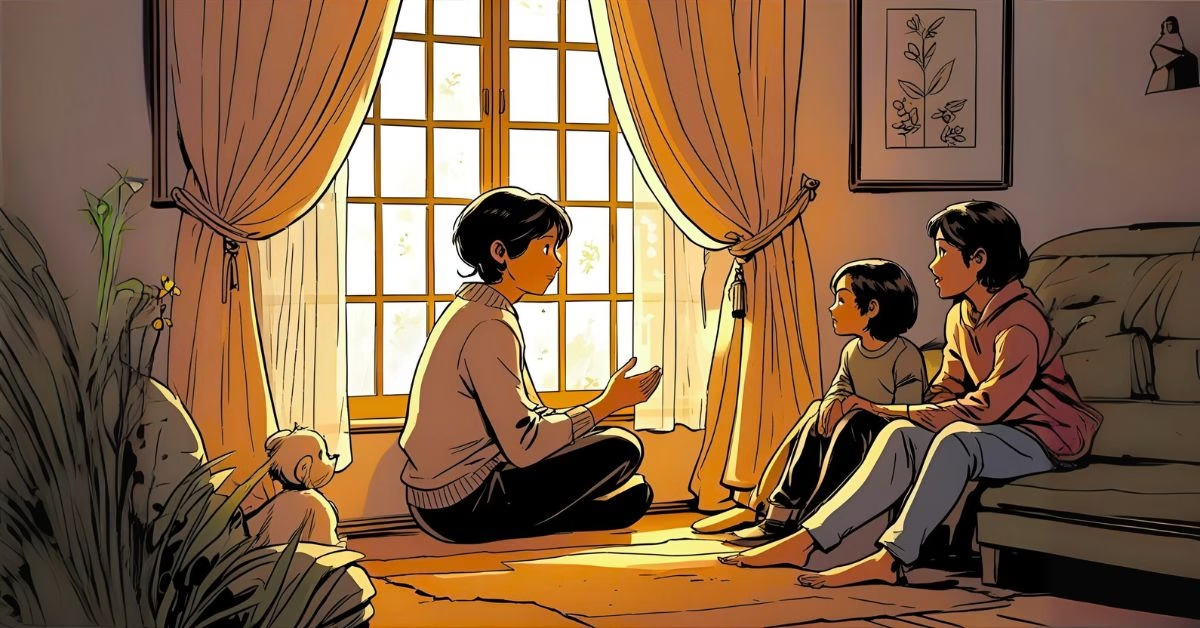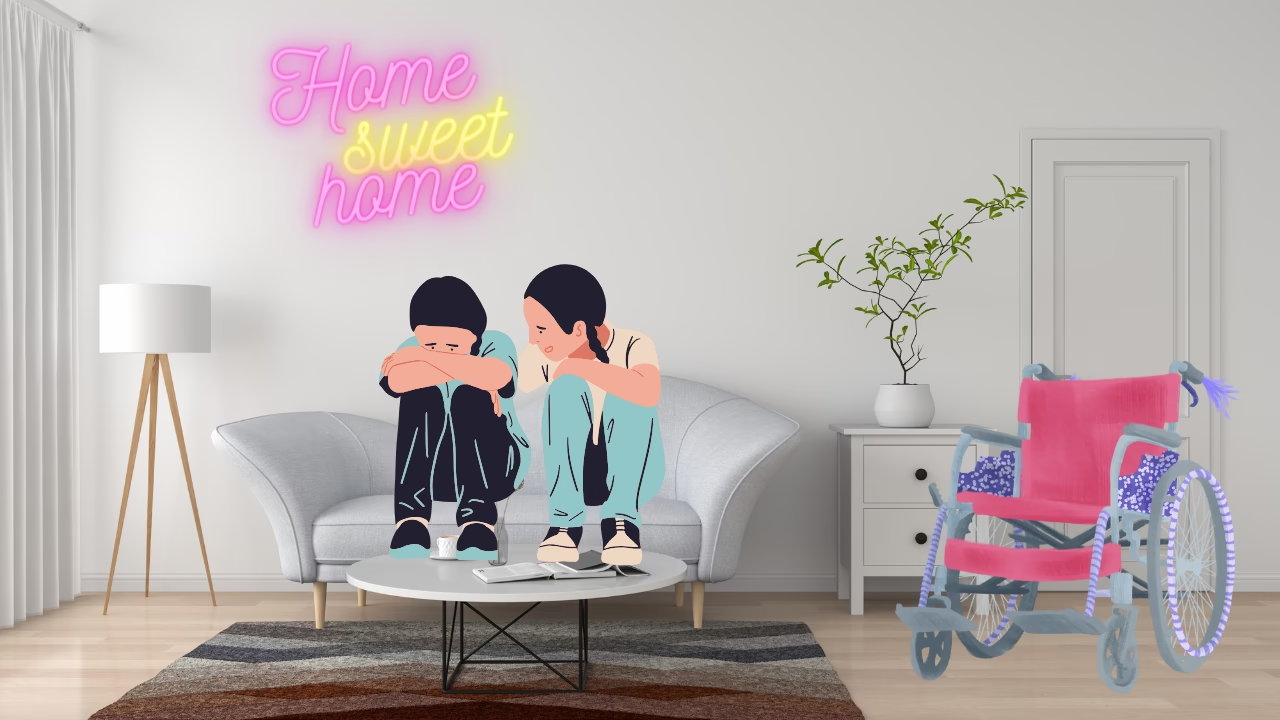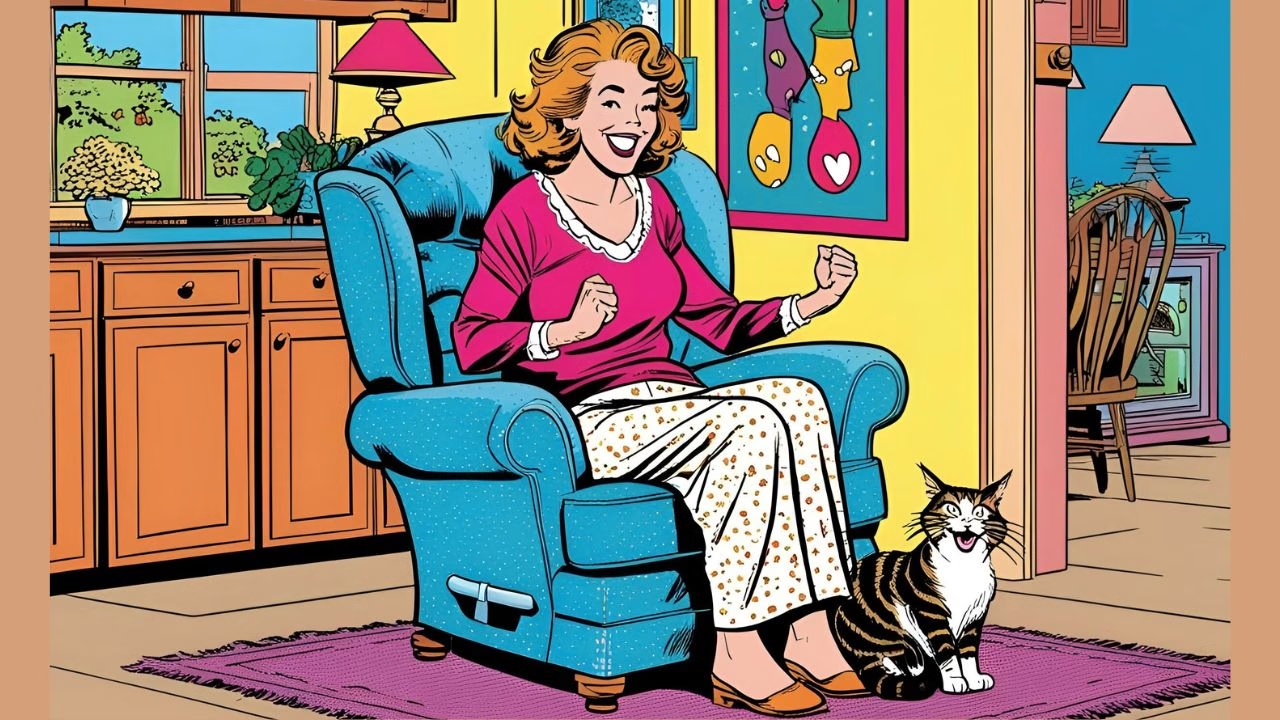✍️Why It’s So Hard to Explain Housebound to Friends and Family
There’s a strange silence that happens when you become housebound. At first, it’s the cancelled plans, the slow withdrawal of invites, or the messages that dry up. But beneath all that lies something more challenging to name: the discomfort people feel when you try to explain what life is really like now. Especially when you try to explain housebound to friends and family.
The truth is, most people don’t know what being housebound actually means. They picture a few duvet days, maybe a touch of boredom, the odd missed event — but not the relentless limits, the loss of independence, the fear that grows when your world shrinks. And they certainly don’t see the deeper layer: the disbelief. Medical gaslighting blocks diagnosis and support. The way society casts doubt on anyone who doesn’t “look” ill or disabled. That doubt filters through the system, through professionals, and right into the eyes of people you love.
This post is for you if you’re trying to explain being housebound, and you’re exhausted by the effort. Whether you’re dealing with chronic illness, physical disability, or a mix of both, this is a space where your reality is valid. And if you’re someone who loves a housebound friend, this is a chance to listen, really listen, to what they might be struggling to say.
We’ll unpack why it’s so hard to be believed, what gaslighting looks like in everyday conversations, and how to talk about this life without constantly defending yourself. And we’ll close with something more solid than public opinion — faith in a God who sees everything, even the suffering the world chooses to ignore.
❓ “But You Don’t Look Sick or Disabled”: The Lies That Undermine Us
One of the biggest challenges when you try to explain housebound life to friends and family is that many people expect illness or disability to look a certain way. They picture someone elderly, frail, or visibly struggling, not someone who appears young, alert, or “fine” from the outside. If you’re housebound but don’t match their mental checklist, you’re often met with confusion, pity, or even disbelief.
It’s even harder the Younger You are
This is especially hard for younger people who suddenly become disabled or chronically ill. Society is used to seeing young people as active, vibrant, and full of energy, so when that image is disrupted, it tends to provoke denial rather than understanding. Friends and family might feel uncomfortable letting go of the version of you they once knew, especially if you were healthy, sporty, or highly active before. That memory becomes a kind of filter — they see that version of you, not the one who now lives with a serious condition.
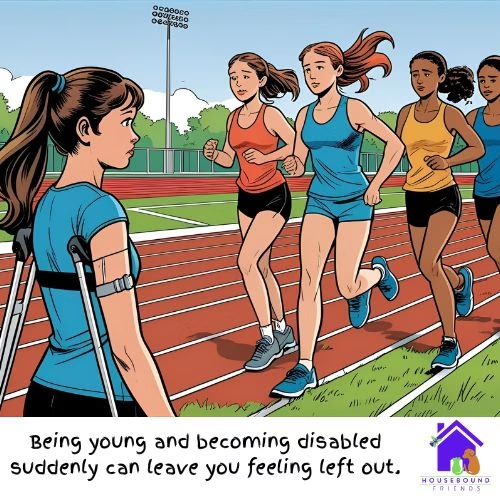
It doesn’t help that housebound people are rarely seen — literally. Suppose you’re not turning up to gatherings, not sharing photos from nights out, and not “proving” your illness by being visibly unwell in public. In that case, it becomes even easier for others to hold on to outdated ideas about who you are and how you’re coping.
And then come the lines we all know too well:
- “But you were doing so well!”
- “You don’t look disabled.”
- “You’re too young to be that ill.”
These are not just awkward comments — they are subtle forms of dismissal. They chip away at your sense of self, making it harder to explain housebound life without sounding defensive.
But here’s the truth: illness and disability don’t always have a visual marker. And when you’re housebound, the gap between your reality and others’ perceptions only grows wider. That’s why these conversations are so vital — not to justify yourself, but to gently bridge that gap with clarity and self-respect.
🩺 How Medical Gaslighting Shapes How Others See You
Once you begin to explain housebound life to friends and family, you quickly run into a wall, not always of hostility, but of inherited disbelief. Much of that resistance doesn’t come from personal malice. It comes from the attitudes they’ve absorbed through the healthcare system.

When a doctor downplays your symptoms, says “everyone gets tired,” or implies your condition is psychological without proper investigation, that dismissal trickles outward. It becomes a narrative that others pick up on, often without realising. If your medical records contain vague or doubtful notes, friends and family usually assume the professionals must know best. You start to feel like you’re trying to defend your reality without backup.
This is medical gaslighting — when a professional dismisses, minimises, or outright denies what you’re experiencing. And because medical authority carries so much social weight, a doctor’s indifference can have devastating ripple effects. Without validation from a doctor, it’s much harder to access benefits, equipment, or social care. And without those supports in place, the people around you assume you must be “basically fine”. It’s a vicious cycle that can leave you housebound and completely unsupported.
💡 So, how do you respond, especially when you’re too unwell to fight battles?
Here are some practical strategies:
- Bring a trusted person (like a friend or family member) to appointments. They can witness the conversation and help push back if you’re dismissed.
- Write down your symptoms in advance and bring a copy with you. Keep your own record — don’t rely on theirs.
- Ask for letters, reports, or second opinions. If something’s being denied verbally, ask for it in writing — many professionals become more careful when they know it’s documented.
- Use disability advocacy services if available in your region. They can attend assessments, help write appeals, and connect you with legal advice.
👥 Friends and family reading this — you can help more than you realise
Sometimes, just your presence can shift how a doctor speaks to a patient. Calmly backing up what your loved one says, or even just asking thoughtful questions (“Can you explain why that symptom isn’t concerning?”) can change the dynamic. Your quiet support in that moment can be life-altering — not dramatic, just solid.
When you explain housebound life, you’re not just telling a personal story — you’re pulling back the curtain on a system that fails thousands in silence. If we can expose the source of the disbelief, we can start to undo its power.
📺 Why It’s So Hard to Explain Housebound Life in Our Society
When you try to explain housebound life, you’re not just up against individual opinions — you’re pushing back against years of cultural programming. Society doesn’t like vulnerability. It doesn’t know what to do with people who cannot “bounce back” or “stay positive.” So instead of compassion, we’re given labels: lazy, needy, exaggerating, attention-seeking. These are the ideas that get planted quietly — through media, politics, even casual conversation — and they shape how friends and family see us.
We’ve been trained to admire grit and independence, not rest and realism. People are praised for “powering through” illness, not for listening to their bodies. If you’re housebound, society tends to assume you’re either not trying hard enough or must be exaggerating for sympathy. And when those assumptions appear on the news, in disability assessments, or in workplace conversations, they become part of the public script.
Friends and family absorb those messages, too. Often, without realising it. When you try to explain housebound life, their doubt might not come from cruelty, but from what they’ve been taught to believe:
- “You’d feel better if you got out more.”
- “You just need something to focus on.”
- “Other people have it worse.”
All of these are symptoms of a deeper problem: a culture that’s uncomfortable with long-term illness, visible or not.
That discomfort makes people rush to minimise what you’re going through — not because they’re bad, but because it challenges their belief in a fair, fixable world. If you could suddenly become housebound, then so could they. And that thought terrifies people.
The only way to interrupt this is with truth. When we explain housebound life honestly — not apologetically — we help rehumanise the conversation. One person at a time, we chip away at the conditioning.
🗣️ How to Explain Housebound Life Without Apologising
When you explain housebound life to others, there’s a temptation to soften your words, to over-justify your limits, or to make it sound more manageable than it really is — just to avoid making others uncomfortable. But you don’t need to apologise for your truth.
You are allowed to speak plainly. You are allowed to take up space, even if that space is on a sofa, in bed, or behind closed doors. Your worth doesn’t depend on how well others understand you, but how you communicate your reality can shape whether people grow alongside you or fall away.
Here are some strong but simple phrases to use in conversations when you’re too tired to explain everything:
- “This isn’t a mindset issue — it’s medical.”
- “I’m doing what I can with the capacity I’ve got.”
- “I know you mean well, but I’m not in a place to take advice right now.”
- “I’d love for you to check in, even if I don’t always have the energy to reply.”
These statements aren’t confrontational. They’re boundaried. Words to protect your energy while keeping the door open to genuine connection.
💡Tip: You don’t have to re-explain housebound life every time someone questions it. Sometimes silence is a powerful answer. Sometimes saying “I don’t have the energy to get into that” is the only explanation you need.
You’re not responsible for reshaping someone else’s expectations. You’re only accountable for staying rooted in truth — and giving yourself the compassion the world might not offer.
💔When You Explain Housebound Life and Even Loved Ones Drift Away
It’s not that we want to be alone. It’s that the effort to explain housebound life — and then still be doubted, dismissed, or cheerfully ignored — becomes too much. Over time, we learn to limit contact, not because we’ve given up on people, but because the emotional weight they bring is heavier than we can carry.
When someone expects us to smile through pain, downplay our symptoms, or reassure them that we’re okay, it’s exhausting. Add to that the subtle judgments: the raised eyebrows, the “helpful” advice, the sighs when we mention a new setback. It creates a kind of emotional noise that drowns out our ability to rest, heal, or even think clearly.
This kind of social stress is especially hard when it comes from people we once felt close to. But as housebound life becomes more isolating, we often have no choice but to protect ourselves. That protection might look like shorter messages, unanswered calls, or letting go of relationships entirely — not out of bitterness, but survival.
This isn’t selfish. It’s spiritual self-defence.
Sometimes we have to draw a line and say: If you can’t meet me where I am, please stop asking me to climb to where I can’t go. The cost is too high. Our energy is precious. Our peace is sacred.
If you’ve had to pull away from people you love, let this be your permission: you are allowed to set boundaries. You’re allowed to stop explaining. And you’re allowed to choose the quiet truth over performative connection.
💞 How to Find People Who Actually Get It When You Explain Housebound Life
Not everyone will understand what you’re going through — and not everyone needs to. But some people will. Some people can. When you explain housebound life from a place of honesty and self-respect, the right people will hear you, not as a burden, but as a person they care about.
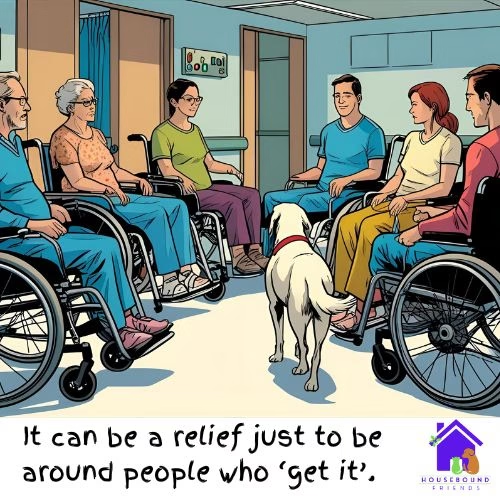
The key is learning to spot the difference between those who are simply curious and those who are capable of holding space.
Look for people who:
- Validate without rushing to fix — they won’t offer a to-do list when you say you’re struggling
- Stay present through discomfort — they don’t disappear when things get messy or long-term
- Don’t need you to shrink — they don’t guilt you into pretending or “cheering up” for their sake
You may not find these people in your old social circles — and that’s okay. Many of us have rebuilt our support from scratch. Online communities for the chronically ill, small faith-based groups, and even disability advocacy spaces can become unexpected lifelines. Look for places where you’re not asked to perform wellness, but where your real life is met with genuine care.
💡 And remember: it’s better to build a small, safe circle than cling to a large, painful one. Even one or two people who really see you can change everything.
You’re not meant to carry this alone — and with the proper support, you won’t have to.
🛐 When the World’s Messages Confuse You, Ask God Instead
When you try to explain housebound life, the world demands proof. Test results, diagnostic labels, endless explanations. And even then, it often isn’t enough.
But God doesn’t need proof. He already sees the truth.
And He sees your weariness, your pain, and the silence that follows when others walk away. In fact, He sees how hard you try, even when no one else notices. Moreover, He hears the prayers that never quite make it into words. And He stays — even when others drift.
When you’re unsure who to trust, or whether to keep trying, or how to answer yet another minimising comment, ask Him:
- “Do I speak up or protect my peace?”
- “Do I explain again or simply rest?”
- “What would You have me do today?”
Sometimes, He’ll guide you to speak the truth in love. Sometimes, He’ll nudge you to quietly let go. But His answer will always be rooted in care – not condemnation.
💛 And to the friends or family reading this:
Thank you for wanting to understand. Thank you for showing up.
If you’re not sure how to help, ask Him too:
- “Help me see what they need — not what I assume.”
- “Guide me in being someone they feel safe around.”
In a world full of noise, doubt, and pressure, God offers a still, clear voice. One that says:
You are seen, you are not alone, and you are loved.
✅ Conclusion: You Don’t Have to Prove the Housebound Life to Be Believed
This life isn’t just physically demanding — it’s emotionally exhausting. Especially when you try to explain housebound life and are met with doubt, discomfort, or silence.
But here’s the truth: you don’t need to prove your pain.
You don’t need to explain yourself to everyone. And you certainly don’t have to shrink to fit other people’s comfort zones.
Let the people who genuinely see you draw closer — the ones who don’t flinch when the story gets hard. And for those who can’t, or won’t, you’re allowed to let them drift, not with bitterness, but with clarity. That’s not giving up. It’s growing stronger.
Ask God to guide your circle. Speak when you’re led to speak. Rest when the weight is too much.
And remember: you are not the problem.
If you’ve ever felt alone in trying to explain housebound life to friends and family, you’re not alone. Honestly, I hope this helps put some of your reality into words.
💌 Please share this post with someone who needs to hear it, or use it when you don’t have the energy to say it yourself.
🧰Practical Help: Resources for Advocacy and Support
United Kingdom and Ireland
Self-advocacy and patient rights:
- Citizens Advice: https://www.citizensadvice.org.uk/
- Patient Advice and Liaison Service (PALS): https://www.nhs.uk/nhs-services/help-with-health-costs/patient-advice-and-liaison-service-pals/
- Healthwatch England: https://www.healthwatch.co.uk/
Disability benefits and equipment:
- Disability Rights UK: https://www.disabilityrightsuk.org/
- Turn2us (financial help): https://www.turn2us.org.uk/
- Accessible Housing Register (varies by local council): https://www.gov.uk/apply-home-adaptation-grant
Online peer support groups:
- The Mighty UK Community: https://themighty.co/uk/
- Chronic Illness Alliance: https://chronicillnessalliance.org.uk/
- Housebound Friends
Faith-based or trauma-informed spaces:
- FaithAction: https://www.faithaction.net/
- Care for the Family: https://www.careforthefamily.org.uk/
- The Listening Place (London-based suicide prevention and mental health support): https://listeningplace.org.uk/
United States
Self-advocacy and patient rights:
- National Patient Advocate Foundation: https://www.patientadvocate.org/
- Disability Rights Education & Defense Fund: https://dredf.org/
- Office for Civil Rights, HHS: https://www.hhs.gov/ocr/index.html
Disability benefits and equipment:
- Social Security Disability Insurance (SSDI) and Supplemental Security Income (SSI): https://www.ssa.gov/benefits/disability/
- AbleData (assistive tech info): https://abledata.acl.gov/
- National Rehabilitation Information Center: https://www.naric.com/
Online peer support groups:
- The Mighty: https://themighty.com/
- PatientsLikeMe: https://www.patientslikeme.com/
- Invisible Illness Support Group (Facebook): https://www.facebook.com/groups/InvisibleIllnessSupportGroup/
Faith-based or trauma-informed spaces:
- FaithTrust Institute: https://faithtrustinstitute.org/
- National Alliance on Mental Illness (NAMI) FaithNet: https://www.nami.org/Support-Education/Affiliate-Programs/FaithNet
- The Hope Line: https://thehopeline.com/
Canada
Self-advocacy and patient rights:
- Canadian Patient Safety Institute: https://www.patientsafetyinstitute.ca/
- Disability Alliance BC: https://disabilityalliancebc.org/
- HealthCareCAN: https://www.healthcarecan.ca/
Disability benefits and equipment:
- Canada Pension Plan Disability Benefits: https://www.canada.ca/en/services/benefits/publicpensions/cpp/cpp-disability-benefit.html
- Enabling Accessibility Fund: https://www.canada.ca/en/employment-social-development/services/funding/enabling-accessibility-fund.html
- Assistive Technology Programs (varies by province): https://www.otn.ca/virtual-care/assistive-technology
Online peer support groups:
- Chronic Illness Canada: https://www.chronicillnesscanada.ca/
- Invisible Disabilities Canada: https://invisibledisabilities.ca/
- Hope For Chronic Illness (Facebook): https://www.facebook.com/groups/HopeForChronicIllness/
Faith-based or trauma-informed spaces:
- Canadian Mental Health Association: https://cmha.ca/
- Faith and Mental Health Network: https://faithandmentalhealthnetwork.ca/
- Canadian Christian Meditation Community: https://ccmc.org/
Australia
Self-advocacy and patient rights:
- Health Consumers Queensland: https://www.hcq.org.au/
- Disability Advocacy NSW: https://dansk.org.au/
- Australian Commission on Safety and Quality in Health Care: https://www.safetyandquality.gov.au/
Disability benefits and equipment:
- National Disability Insurance Scheme (NDIS): https://www.ndis.gov.au/
- Centrelink Disability Support: https://www.servicesaustralia.gov.au/individuals/services/centrelink/disability-support-pension
- Assistive Technology Australia: https://at-aust.org/
Online peer support groups:
- SANE Australia: https://www.sane.org/
- Chronically Awesome (Facebook): https://www.facebook.com/chronicallyawesome/
- Beyond Blue: https://www.beyondblue.org.au/
Faith-based or trauma-informed spaces:
- Anglicare Australia: https://www.anglicare.asn.au/
- CatholicCare: https://www.catholiccare.org.au/
- Faith and Mental Health Australia: https://faithandmentalhealth.org/
New Zealand
Self-advocacy and patient rights:
- Health and Disability Commissioner: https://www.hdc.org.nz/
- Disability Rights Commissioner (Ombudsman NZ): https://www.ombudsman.parliament.nz/
- Health Quality & Safety Commission NZ: https://www.hqsc.govt.nz/
Disability benefits and equipment:
- Ministry of Social Development – Disability Support: https://www.msd.govt.nz/what-we-can-do/disability/index.html
- Assistive Technology Services: https://www.health.govt.nz/our-work/disability-services/assistive-technology
- Work and Income NZ Disability Services: https://www.workandincome.govt.nz/products/a-z-benefits/disability-benefit.html
Online peer support groups:
- Chronic Illness NZ: https://www.chronicillnessnz.org.nz/
- Invisible Disabilities NZ: (no official site, suggest Facebook groups)
- Depression.org.nz: https://www.depression.org.nz/
Faith-based or trauma-informed spaces:
- Anglican Care NZ: https://www.anglicancare.org.nz/
- Soul Action NZ: https://www.soulaction.org.nz/
- Hope Project: https://hopeproject.co.nz/


